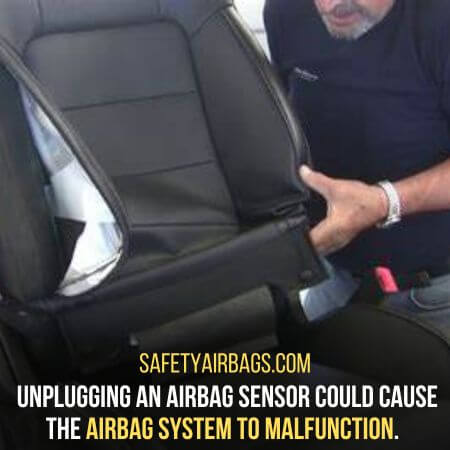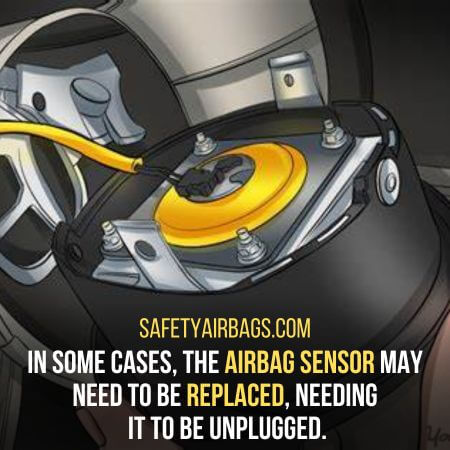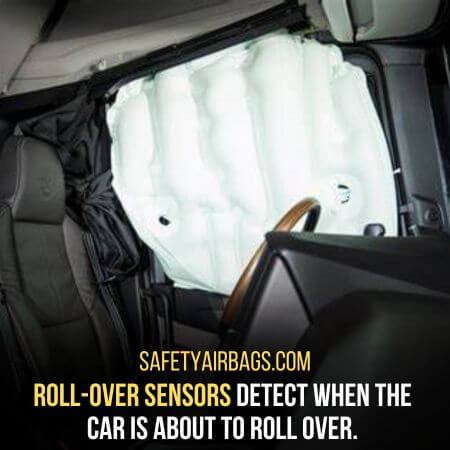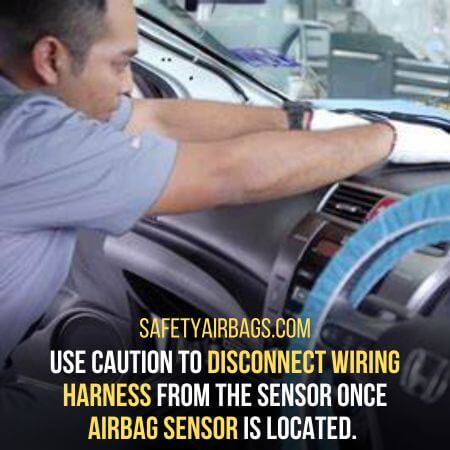Sometimes people may ask, “Can you unplug an airbag sensor?” Airbag sensors are an essential component of a vehicle’s safety system. They are responsible for detecting a collision and triggering airbag deployment.
What Will I learn
This article will explore the possibility of unplugging an airbag sensor, including its potential risks and consequences.
Can You Unplug An Airbag Sensor
While it may be possible to unplug an airbag sensor, it is not recommended. Instead, it is recommended that a qualified mechanic carry out any repairs or modifications to the airbag system.

They can ensure that the system remains functional and safe. Airbag sensors are typically located in the front of a vehicle, near the bumper or frame. They are designed to be highly sensitive.
They can detect changes in velocity and acceleration caused by a collision.
These sensors are essential for ensuring airbags deploy when needed. In addition, they play a critical role in protecting vehicle occupants from serious injuries.
However, there may be situations where someone might want to unplug an airbag sensor. For example, when installing an aftermarket steering wheel or repairing a vehicle.
It may be technically possible to unplug an airbag sensor. However, doing so could have serious consequences for the safety of the vehicle’s occupants.
1. Malfunctioning Of Airbag System:
Firstly, unplugging an airbag sensor could cause the airbag system to malfunction.
Airbag sensors work with other components in the system, including the control module and the airbags themselves.
The control module will not receive the necessary signals if the airbag sensor is unplugged. Thus, the system may not deploy during an accident.
This can significantly compromise the safety of the car’s occupants. It can leave them vulnerable to severe injuries, including head injuries, spinal cord injuries, and broken bones.
2. Triggering Of Warning Lights:
Additionally, unplugging an airbag sensor could trigger warning lights on the dashboard.
Most modern cars have an onboard diagnostic system that can detect when a component in the airbag system is malfunctioning.
If an airbag sensor is unplugged, it could trigger a warning light on the dashboard.
It could make it difficult for the driver to determine if there is a problem with the airbag system or if it’s just a false alarm.
3. Affect Vehicle’s Insurance Coverage:
Another potential consequence of unplugging an airbag sensor is that it could affect the vehicle’s insurance coverage.
In many jurisdictions, vehicles must have functioning airbags to be considered roadworthy.
Suppose a vehicle is involved in an accident. It was discovered that the airbags were not functioning properly because an airbag sensor was unplugged.
In that case, the vehicle’s insurance may be invalidated. This could result in significant financial losses for the driver. It could even put them at risk of legal action.
4. Affect Vehicle’s Resale Value:
Furthermore, unplugging an airbag sensor could also affect the vehicle’s resale value.
When buying a used car, potential buyers may be wary of purchasing a vehicle with its airbag system tampered with, even if the problem has been resolved.
This could make it difficult to sell the vehicle in the future, resulting in a lower resale value.
5. Difficulty Diagnosing Other Problems:
If an airbag sensor is unplugged, it could also make it more difficult for mechanics to diagnose other problems with the vehicle.
Airbag sensors are just one component of a complex system. They can often indicate other problems, such as vehicle suspension or braking system issues.
If the sensor is unplugged, it could make it harder to determine the root cause of any problems.
6. Affect Car Safety Features:
Additionally, modern cars often have various other safety features that work with the airbag system. These can be seat belts, electronic stability control, and antilock brakes.
If the airbag sensor is unplugged, it can also cause these other safety features to malfunction. This can reduce the effectiveness of the car’s safety systems.
Reasons To Unplug An Airbag Sensor
While it is generally not recommended to unplug an airbag sensor, there may be some situations where it is necessary.
Here are some reasons why someone may want to unplug an airbag sensor:
1. Repairs:
If there is a problem with the airbag system, it may be necessary to unplug the sensor to diagnose and repair it.
In some cases, the airbag sensor may need to be replaced entirely, requiring it to be unplugged.
2. Aftermarket Modifications:
Some car owners may want to install an aftermarket steering wheel incompatible with the original airbag system.

In this case, they may need to unplug the airbag sensor to remove the original steering wheel and install the new one.
However, it is important to note that this can significantly compromise the vehicle’s safety. The new steering wheel may not be designed to work with the airbag system.
3. Testing:
In some cases, mechanics may want to test the airbag system without actually deploying the airbags.
They may need to unplug the sensor to do so. However, testing is not mandatory, but it can be a part of rechecking the functionality of the airbags.
Understanding Airbag Sensors
Airbag sensors are essential components of a car’s safety system. They are designed to detect sudden changes in velocity and acceleration caused by a collision.
Once a collision is detected, the sensors send signals to the airbag control module. Then, it activates the airbags to deploy and protect the car’s occupants.
There are several types of airbag sensors. Each is designed to detect different types of collisions and impacts.
Here are some of the most common types:
1. Accelerometer Sensors:
Accelerometer sensors are the most common type of airbag sensor. They are typically mounted on the front of the car and detect changes in velocity caused by a collision.
They measure the car’s acceleration and send signals to the airbag control module.
2. Side Impact Sensors:
Side impact sensors are typically located in the car’s doors and are designed to detect side collisions.
They work by measuring changes in pressure caused by the impact and sending signals to the airbag control module.
3. Roll-over Sensors:
Roll-over sensors are designed to detect when the car is about to roll over.

They work by measuring the car’s angle and rate of rotation and sending signals to the airbag control module.
4. Weight Sensors:
Weight sensors are typically located in the car’s front seats and are designed to detect the weight of the occupants.
They measure the pressure on the seat and send signals to the airbag control module.
5. Brake Sensors:
Brake sensors are designed to detect sudden braking and are typically located in the brake pedal.
They work by measuring changes in pressure and sending signals to the airbag control module.
In addition to these sensors, some cars also have advanced airbag systems. They use cameras and other sensors to detect the position and size of the occupants.
This allows the airbag system to adjust the deployment of the airbags to provide optimal protection for each occupant.
It is important to note that airbag sensors are designed to work together as a system. Therefore, each sensor is calibrated to work with the others.
Unplugging or tampering with one sensor can cause the entire system to malfunction. As a result, it can significantly reduce the safety of the vehicle.
Therefore, it is important to only make repairs or modifications to the airbag system by a trained professional.
How To Properly Disconnect An Airbag Sensor If Necessary
Disconnecting or tampering with airbag sensors is generally not recommended unless necessary. Doing so can compromise the vehicle’s safety.
However, in certain situations, it may be necessary to disconnect the airbag sensor.
Here are some general steps to follow to disconnect an airbag sensor properly:
1. Please Turn Off The Ignition:
Before disconnecting any airbag sensors, turning off the ignition and disconnecting the battery is important.

This can prevent any electrical surges that could activate the airbag system.
2. Locate The Airbag Sensor:
Depending on the make and model of the vehicle, the airbag sensor may be located in different places.
Consult the vehicle’s manual or a trusted mechanic to locate the sensor.
3. Disconnect The Wiring:
Use caution to disconnect the wiring harness from the sensor once the airbag sensor is located.
Some sensors may have a locking mechanism that needs to be released before the wiring can be disconnected.
4. Remove The Sensor:
Remove the airbag sensor from its mount after disconnecting the wiring.
Some sensors may be bolted on, while others may be held in place by clips or other mechanisms.
5. Store The Airbag Sensor Safely:
After removing it, store it in a safe and secure location to prevent damage or accidental activation.
It is important to handle the sensor with care, as any damage to the sensor can compromise its ability to function properly.
When reconnecting the airbag sensor, it must be done properly to ensure the safety of the vehicle’s occupants.
Consult a trusted mechanic or professional if unsure how to disconnect or reconnect an airbag sensor properly.
Final Thought:
In general, unplugging or tampering with airbag sensors is not recommended unless absolutely necessary.
Airbag sensors play a critical role in the safety of a vehicle’s occupants. Therefore, any interference with the system can compromise its ability to function properly during a collision.
It is important to consider the vehicle’s occupants’ safety before unplugging an airbag sensor. It is always best to consult a trusted mechanic or professional for advice if in doubt.
